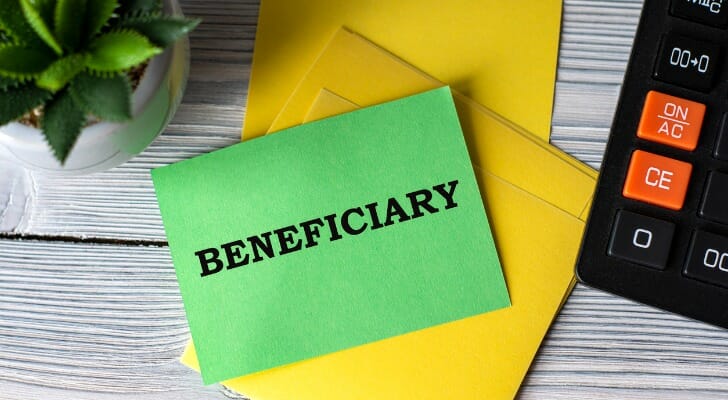When someone names their estate as the beneficiary of their IRA, the account does not pass directly to heirs but instead becomes part of the probate process. In practice, this can result in less flexibility, an accelerated distribution timeline and potentially higher taxes. Choosing an estate as the beneficiary of an IRA can affect how quickly and efficiently heirs gain access to the funds.
Unsure how your IRA fits into your estate plans? Connect with a financial advisor who can help you structure your assets with your goals in mind.
Designating an Estate as Beneficiary of an IRA
You can name any individual as the beneficiary of your IRA, meaning they would receive the funds upon your death. Many don’t people realize that you can also designate an entity, such as a trust or even a business. Another option is to allow the IRA to pass to your estate by default. While this may seem simpler since it doesn’t require choosing a specific beneficiary, many consider it a less favorable choice.
If you designate your estate as the beneficiary, your IRA funds will first pass through the estate before reaching your heirs. This process typically places the money under the terms of your will and, in many cases, the oversight of probate court. Without a will, it is often preferable to name a direct beneficiary for your IRA rather than letting the assets fall into your estate.
What Is Probate?
When it comes to IRAs, naming your estate as the beneficiary or failing to name a beneficiary often have the same result. In either case, the account typically passes into the estate and becomes subject to probate.
Probate is the legal process that occurs after someone dies to settle their estate. A court validates the will, if there is one, and oversees the payment of debts and taxes before distributing remaining assets to heirs. If no will exists, state law determines who inherits the estate.
For retirement accounts like IRAs, designating beneficiaries allows the assets to pass directly to those individuals without court involvement. If you don’t name beneficiaries, however, the IRA typically becomes part of the estate and must go through probate.
This means the funds may be tied up in a formal court process before reaching heirs. Probate also makes the estate’s details part of the public record, which is why many people use beneficiary designations or trusts to transfer retirement assets outside of probate.
Reasons to Name Your Estate as an IRA Beneficiary

For most people, simply giving your IRA to your estate isn’t the path you want to take. But in case you are wondering why it might be done, some people might feel that it’s best to designate the estate to be a beneficiary of an IRA for several reasons:
- It’s easier: For instance, if you have a lot of family members, you may feel like it’s better to let them work everything out after you are gone rather than pick one or some beneficiaries and create hurt feelings.
- You don’t have a strong opinion on where your IRA goes: You may simply not care all that much about what happens to the money. If that’s the case, perhaps making your estate the beneficiary makes sense.
- You don’t have many potential beneficiaries: Not everyone has children or many family members. But it’s worth mentioning that instead of giving your IRA to your estate, you could make a friend a beneficiary or a charity or an organization, such as a university or a library.
- You want to leave the money to a minor in a trust: You could also give the IRA to a trust and have someone distribute the money disperse the money in whatever way you wish. A trust can also be a good idea for somebody who wants to leave the IRA for a minor. If the minor is too young to responsibly handle the money, the trustee could manage and distribute the income to the child.
When you set up your IRA, you likely named beneficiaries on the designation form. However, if you now have a family, it’s possible that you established the account before getting married or having children. In that case, you’ll need to update your beneficiary information by contacting your IRA administrator and completing the necessary paperwork. This step helps ensure that your family will inherit the account if something happens to you.
Reasons Not to Name Your Estate as an IRA Beneficiary
Naming your estate as the beneficiary of your IRA can create several unintended consequences:
- Accelerated distribution timeline: Under the SECURE Act, most non-spouse beneficiaries must withdraw the entire account within 10 years. Certain “eligible designated beneficiaries,” such as spouses or siblings close in age, can stretch distributions over their lifetimes. If your estate is the beneficiary, however, the account generally must be emptied within five years, which reduces flexibility.
- Higher taxes and costs: A compressed distribution schedule can push heirs into higher tax brackets. In addition, probate fees and estate administration expenses can further reduce the amount passed on to your family.
- Exposure to creditors: Assets that flow through your estate may be subject to claims from creditors, which means heirs could receive little or nothing from the IRA.
- Risk of disputes: Without named beneficiaries, a court may decide how assets are distributed, leaving room for challenges from family members you may not have intended to include.
Imagine you have a $400,000 IRA but never update your beneficiary form. When you die, the account passes to your estate and must be emptied within five years. This accelerated timeline requires larger withdrawals, which can lead to higher tax bills. Probate fees and court costs further reduce the balance, meaning your heirs receive far less than if you had simply named them as direct beneficiaries.
Bottom Line

An IRA gives you the ability to decide who inherits your savings, whether that’s a spouse, children, other loved ones, a trust, or even a charity. While naming your estate as the beneficiary may seem straightforward, it typically leads to probate, compressed withdrawal timelines and added costs. Directly naming beneficiaries or using a trust when appropriate, often provides more control over how the account is managed after death.
Estate Planning Tips
- Whether or not to give your IRA to your estate or select individuals to receive it is a good topic to discuss with your financial advisor. They can help you through the process to see what the best choice is for your unique situation. If you don’t have a financial advisor then finding one doesn’t have to be hard. SmartAsset’s free tool matches you with up to three financial advisors who serve your area, and you can interview your advisor matches at no cost to decide which one is right for you. If you’re ready to find an advisor who can help you achieve your financial goals, get started now.
- As you plan out your estate, you’ll want to make sure you don’t miss anything. Review our estate planning checklist as you go through this important planning process.
Photo credit: ©iStock.com/Rockaa, ©iStock.com/dragana991, ©iStock.com/Zhanna Hapanovich
